Filipino ancestors’ humane treatment of starving Magellan-Elcano sailors in spotlight
By: Angie Quadra-Balibay
|
Published on: March 21, 2021
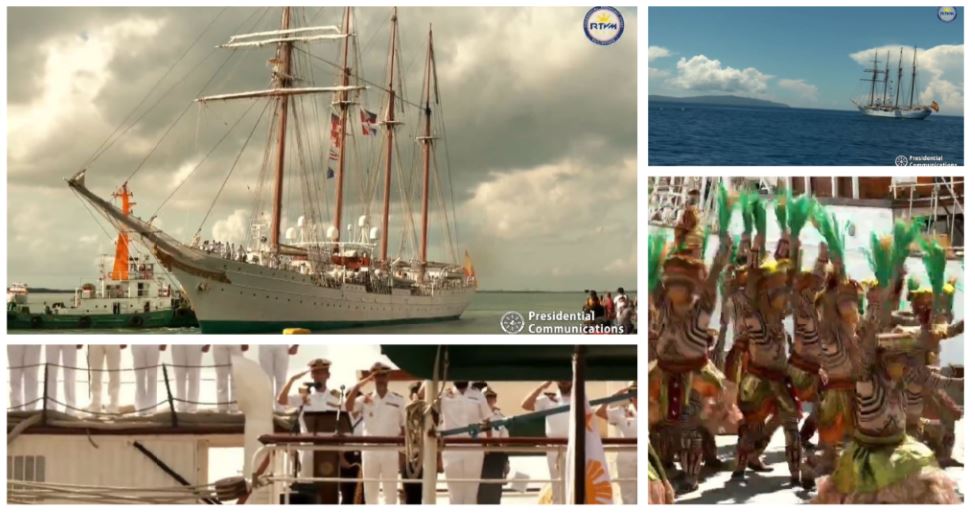
The welcoming of the arrival of the Spanish Navy training ship Juan Sebastian De Elcano in the waters of Eastern Samar on March 16, 2021, signaled the official start of the Quincentennial Commemorations in the Philippines. NQC images.
The Filipino nation’s ancestors’ humane treatment of the starving and sick members of the Fernando “Ferdinand Magellan” Magallanes-Juan Sebastian De Elcano crew who arrived in the islands 500 years ago in 1521 is in the spotlight of the Philippines’ commemorations of the first circumnavigation of the world.
The Quincentennial Commemorations in the Philippines officially started earlier this week on March 16, 2021, with the arrival of the Spanish Navy training ship, Juan Sebastian De Elcano in the Philippines’ seas, specifically at Suluan, Guiuan in Eastern Samar.
After Magellan, the Portuguese-born leader of the expedition, died in Mactan, the Spanish navigator, Elcano, completed the first recorded circumnavigation of the world on board the Victoria, covering a distance of over 40,000 miles from 1519 to 1522 by the time it arrived back in Spain.
The role of the Filipino ancestors in aiding the Magellan-Elcano expedition to continue on to complete its mission has been highlighted in the national celebrations. Historical records bear that the expedition members who have been sailing on the seas for two years experienced starvation, illnesses, and death. The islanders saw the situation and thereafter tended to the needs of the foreigners.
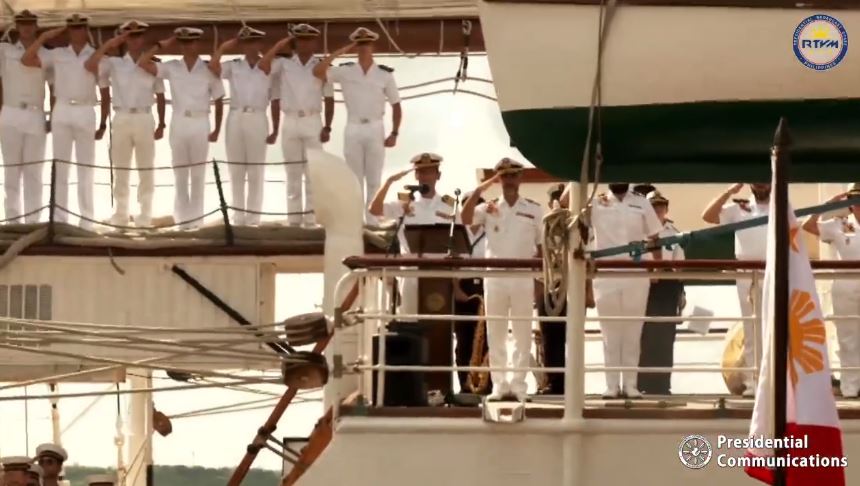
Elcano ship crew execute a salute as the Philippine National Anthem plays during its goodwill port call in Cebu on March 20, 2021. NQC image
“Surprisingly, the ancient Warays of Suluan, a nearby island from here, also part of Guiuan, discovered in this island of Homonhon the skinny, deprived of nourishment, dehydrated, and almost dying crew of Ferdinand Magellan. On March 16, 1521, our ancestors from Suluan already saw their ships.
“The following day, March 17, 1521, these unfortunate foreigners landed in Homonhon, unconscious how sacred the land was, and enjoyed the freshwater there, a wild boar, and, most likely, fruits.
“Then the next day, March 18, 1521, our ancestors landed in Homomhon with their grandly decked chief and signaled friendship,” recounts Dr. Rene R. Escalante, Chairperson of the National Historical Commission of the Philippines (NHCP) and Executive Director of the National Quincentennial Committee (NQC), during the unveiling of the Homonhon Quincentennial Historical Marker in Homonhon Island, Guiuan, Eastern Samar, on March 17.
“Magellan thought these people from Suluan would attack them. They could not understand each other at first yet our ancestors understood the language of humanity.
“Pigafetta may not have captured the nuance of this gesture and the symbolism of Homonhon to our ancestors, but what our ancestors exhibited is typically Filipino.
“We call it pakikipagkapwa in Filipino psychology or the sense of seeing someone as an extension of yourself. It’s a uniquely Filipino value worthy of celebration this 2021 Quincentennial Commemorations in the Philippines—and it all happened here in Homonhon,” adds Escalante.
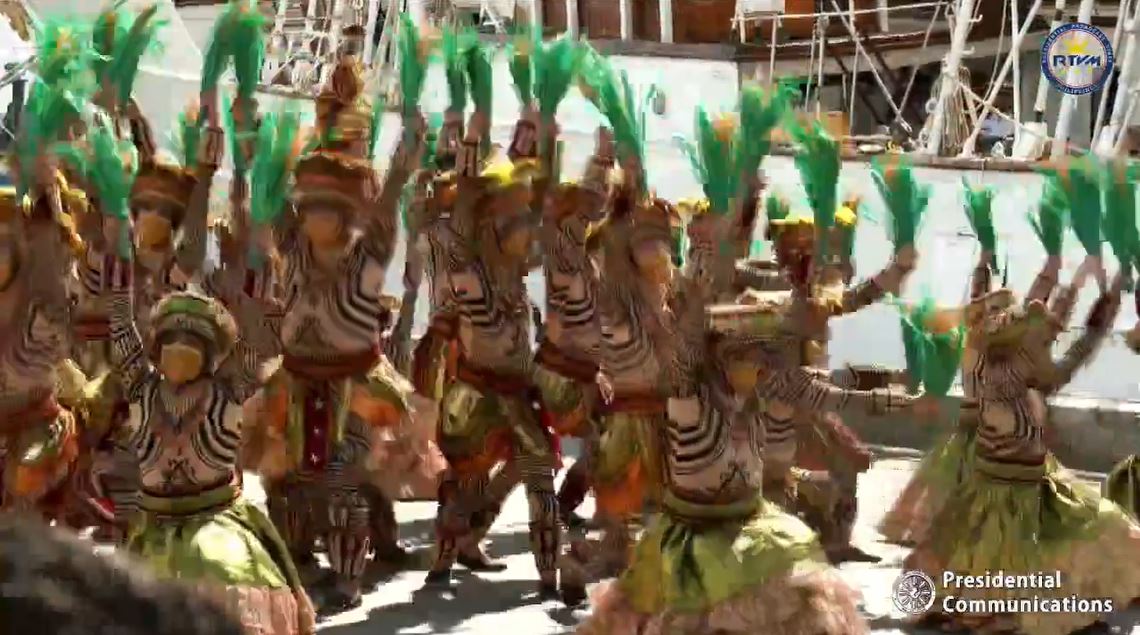
Cebu welcomes the Elcano crew with a lumad dance presentation. NQC image
The Spanish Navy ship bearing the name of Elcano, the world’s third-largest tall ship at 113 meters long, graced the unveiling of the historical markers of its predecessor’s arrival in the islands 500 years ago on its way to finding an alternative route to Southeast Asia.
“Unfortunately, a lot of Filipinos, as well as foreign nationals, do not know this episode in the history of the first circumnavigation of the world. We are glad that today, we are marking that episode through this historical marker we are about to unveil.
“This marker shall be a perpetual reminder to those who will visit this place of our heritage of compassion which we are known at. 500 years later, things have changed but not the kind of compassion we have inherited from our great ancestors.
“Be conscious of the beautiful things about our culture, and it is as if our ancestors are enshrined deep in our hearts and in our souls. And with this, surely we will get to where we want to go and what we want to be, as an individual, a family, a community, a society, a country,” shares Dr. Escalante.
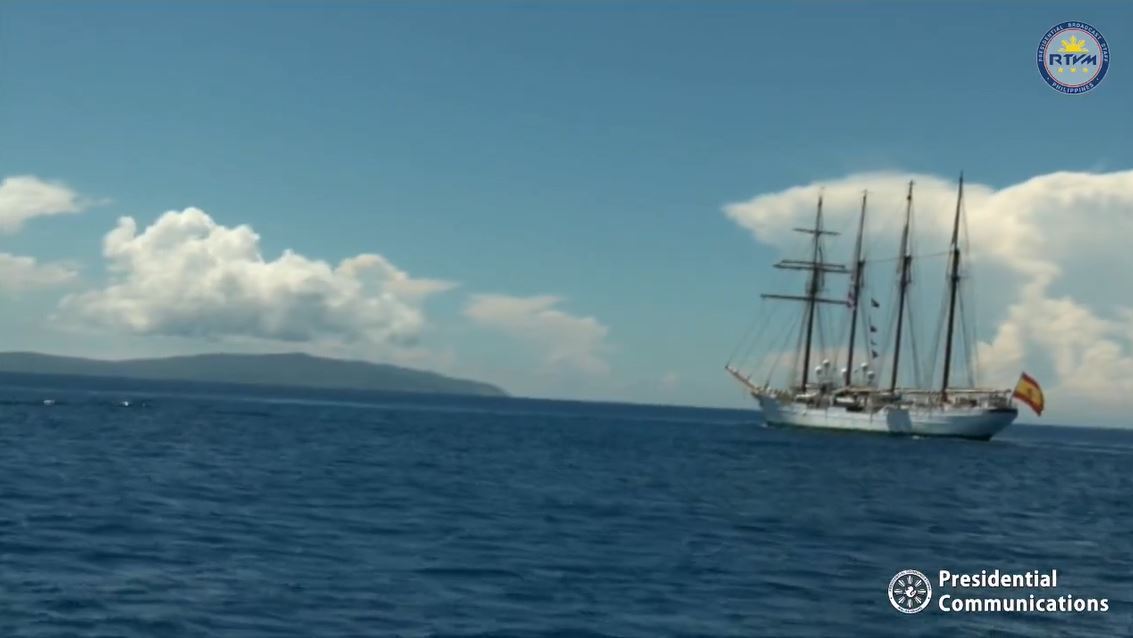
The Spanish Navy training ship Elcano in Suluan waters on March 16, 2021.
Filipino ancestors feeding the hungry, healing the sick
The “first contact” between the people of the islands later to be called the Philippines and the Spanish expedition members brought out compassion from the former for the latter, giving the Europeans hope.
“Often regarded in the past as the ‘discovery of the Philippines’, the 16 March 1521 in world history was the beginning of our ancestors’ contribution to this achievement of science and humanity. Filipino poet and writer Luis Francia described this episode as “a revival of their lives if not their fortunes” (referring to the expedition). Because two days later, our ancestors from Samar discovered Magellan and his men at Homonhon Island, now under the jurisdiction of Guiuan, Eastern Samar, needing help. Compassion was exhibited by our ancestors which gave hope to Magellan and his crew,” states the NQC.
“The following day, 17 March 1521, the expedition made its first landfall at Homonhon, also an island now under the jurisdiction of Guiuan. Scholar Luis Francia described this moment as ‘a revival of their lives if not their fortunes’, mainly because Magellan’s depleting crew—sick and starving for almost four months of braving the Pacific—nourished their selves with the fruits and spring water of Homonhon for nine days. Before reaching the Philippines, Magellan’s sickly crew were requesting their comrades to bring them the entrails of the people they could kill in Guam, in the belief it could nourish them. The expedition indeed almost pushed them to the bounds of reason,” wrote historian Xiao Chua in “When Our Ancestors ‘Discovered’ Magellan”.
“The following day, 18 March 1521, a group of natives approached the expedition in Homonhon. Upon seeing our ancestors, Magellan instructed his men to do and say nothing unless ordered so. Even though they could not understand the foreigners, the humanity in our ancestors prevailed: an unnamed chief himself (most probably a rajah from mainland Samar, based on the descriptions), who was in Suluan at that time, confirmed the expedition were undernourished and starving. The rajah immediately ordered his men to provide the expedition decent food (i.e., fish, banana, coconut). The Spaniards tasted our ancestors’ palm wine and what was already our staple food—kanin or rice. They also discovered how versatile coconut was in our ancestors’ lives: from drinks, dessert, oil, milk, ointment, and condiments. Reciprocating the kindness of our ancestors, Magellan toured them inside his flagship, Trinidad, and showed them its contents and armament,” adds Chua.
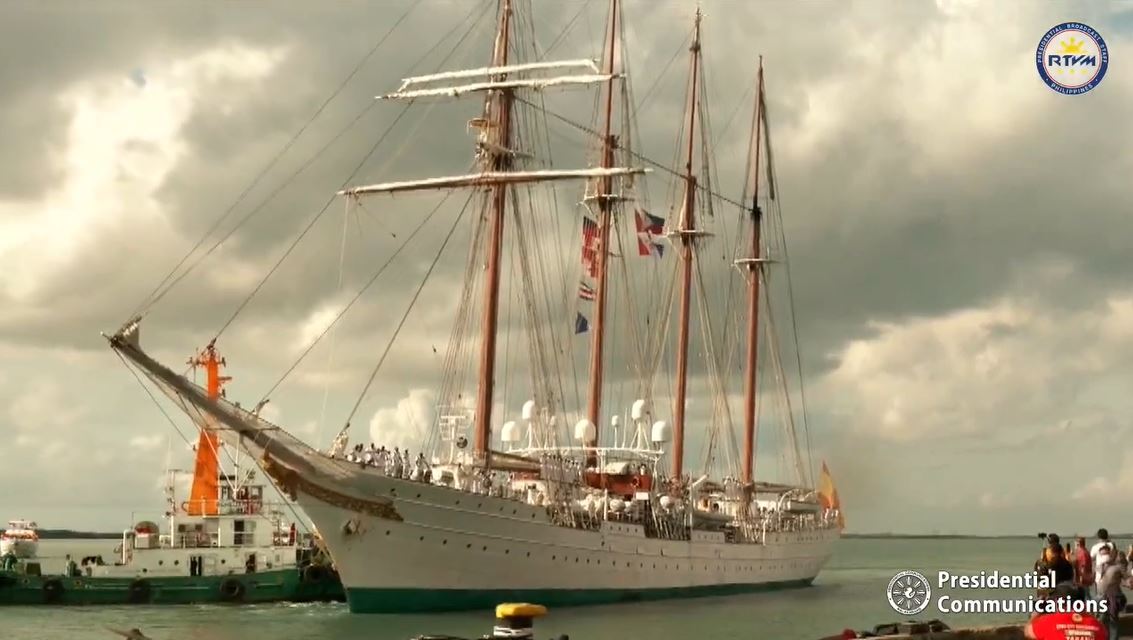
The Spanish Navy training ship Elcano at the port of Cebu on March 20, 2021.
The humanity of Filipinos
The Philippine celebrations highlight the humanity of the Filipino ancestors, a trait that has been exhibited over and over again throughout history.
“Beyond hospitality, we Filipinos inherited from our ancestors and forebears the gift of magnanimity. History attests to this: when we received the Japanese Christians banished out of Japan in the late 16th century following the outlawing of Christianity by Emperor Hideyoshi; the humanity our young Republican army showed to the last Spanish soldiers in Baler in 1899, sustaining them with provision while in hiding inside Baler Church for a year; the Open-Door policy of Quezon which saved a thousand Jewish refugees from the Nazis while the world was hesitant to do so; the White Russians expelled out of USSR and communist China in 1949, who were received in the same town that sheltered Magellan: Guiuan; and many more,” writes the NQC in its rationale for the “Humanity of Filipinos” theme of the celebrations.
Among its efforts to help educate the Filipino nation about the real stories behind the arrival of the Spaniards in the islands 50 years ago, Visayan troubadour Yoyoy Villame’s 1972 pop hit song “Magellan” was reissued in a music video with historical footnotes.
SEND MABUHAY CHEERS in the comments below to the Philippines for putting the spotlight on our Filipino ancestors’ humane treatment of the starving Magellan-Elcano crew as the country celebrates its role in the first recorded circumnavigation of the world 500 years ago in 1521.
Good News Pilipinas is celebrating its 15th Anniversary in 2021 by giving away prizes! Subscribe to our Good News Pilipinas! TV YouTube channel and enter the raffle by sending us an email to editor@goodnewspilipinas-com-256437.hostingersite.com